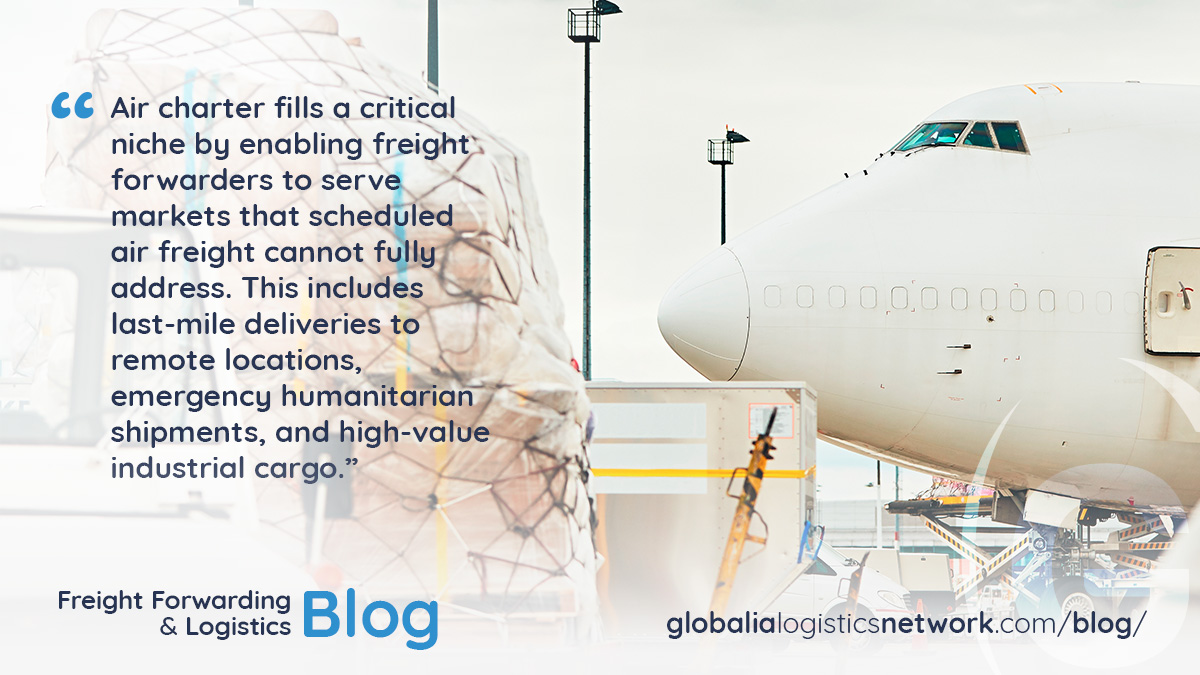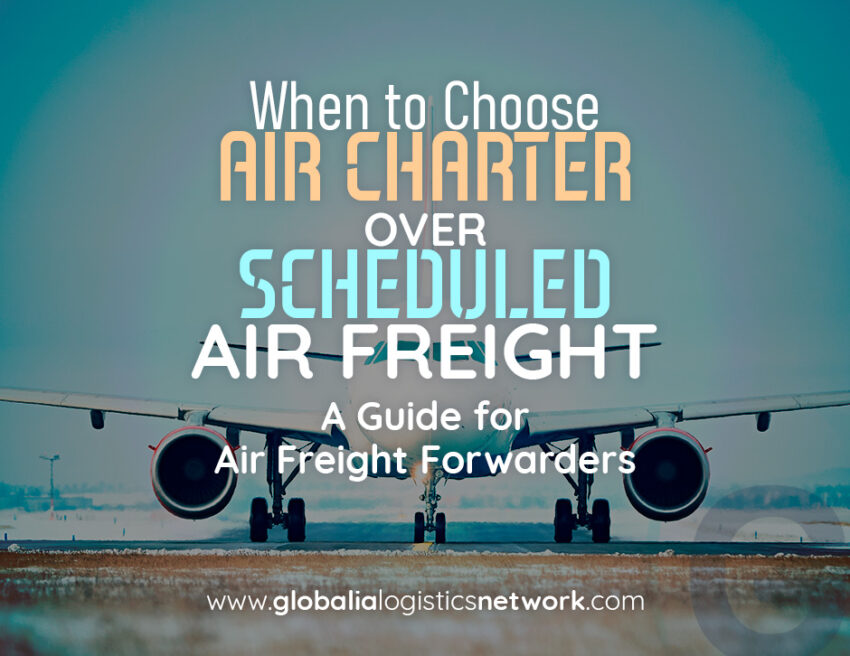When a client calls with an urgent shipment, what’s your first move? Do you stick to scheduled air freight and risk delays or do you go straight for an air charter solution? For freight forwarders, these decisions can make or break customer relationships. Scheduled services are great for predictable, routine shipments. But when the clock is ticking or the cargo is oversized or highly specialized, air charter might be the smarter move. Knowing when to switch gears isn’t just about speed; it’s about delivering the right solution at the right time and keeping your clients coming back.
Understanding the basics: Scheduled air freight vs. air charter
Scheduled air freight is the backbone of international logistics. Airlines operate regular routes and timetables, offering predictable options for moving goods between major hubs. This type of service is generally more cost-effective because space is shared among multiple shippers. However, scheduled flights come with fixed departure times, restricted flexibility, and limited control over routing and handling.
In contrast, air charter provides a flexible, dedicated solution. Freight forwarders can secure an entire aircraft for a single shipment, enabling faster transit times, customized routes, and the ability to handle unusual cargo dimensions. Charter services are ideal for time-sensitive deliveries, project cargo, or high-value shipments that demand special handling.

When speed is critical: Meeting tight deadlines
One of the most compelling reasons to opt for air charter is speed. For freight forwarders handling urgent shipments, whether it’s medical supplies, perishable goods, or just-in-time inventory, scheduled flights may not always align with the client’s timeline. Charter flights can depart at short notice, bypassing the constraints of airline schedules and reducing waiting times at congested airports.
For example, a freight forwarder tasked with delivering critical machinery to a manufacturing plant can avoid production delays by arranging an air charter. While the cost may be higher than using a scheduled service, the value lies in reliability and on-time delivery factors that can outweigh additional expenses for clients.
Handling oversized or specialized cargo
Another scenario where air charter becomes advantageous is with oversized or specialized cargo. Freight forwarders often deal with items that exceed standard cargo dimensions, including industrial equipment, aircraft parts, or temperature-sensitive pharmaceuticals. Scheduled flights typically have strict limitations on weight, size, and configuration, whereas chartered aircraft can accommodate unusual dimensions and special handling requirements.
By providing dedicated space, air charter ensures that sensitive cargo is secured properly, reducing the risk of damage during transit. Moreover, freight forwarders can arrange customized loading, packaging, and documentation, which is often not feasible with scheduled services.
Cost considerations
While air charter offers unparalleled flexibility and speed, freight forwarders must carefully evaluate the cost implications. Chartered flights are generally more expensive than scheduled air freight because the shipper bears the cost of the entire aircraft. However, when factoring in potential losses due to delays, production downtime, or missed deadlines, the investment can be justified.
For freight forwarders, understanding the client’s priorities is crucial. In scenarios where time, security, or specialized handling is paramount, the added cost of a chartered flight can translate into client satisfaction and long-term business relationships.
Enhancing customer service through air charter
Integrating air charter options into an air freight forwarding portfolio allows forwarders to offer highly responsive services. Clients increasingly demand flexibility, transparency, and reliability in logistics. By providing charter options, forwarders can differentiate themselves in a competitive market, demonstrate expertise, and strengthen trust.
Additionally, charter services enable freight forwarders to manage complex supply chains more effectively. Whether coordinating multiple shipments, navigating last-minute changes, or handling sensitive cargo, having access to dedicated aircraft provides a strategic advantage.
Key decision factors for air freight companies
Air freight companies should consider several factors when deciding between scheduled air freight and air charter:
-
Urgency of Delivery: How critical is the delivery timeline? If delays could lead to financial loss or reputational damage, air charter may be the better option.
-
Cargo Type: Oversized, high-value, or sensitive cargo often requires the flexibility and dedicated handling provided by charter flights.
-
Route and Airport Access: Some destinations or secondary airports may not be serviced by scheduled carriers, making charter flights necessary.
-
Budget vs. Value: While cost is a consideration, the benefits of timely delivery, security, and customer satisfaction can outweigh higher expenses.
By weighing these factors, freight forwarders can provide tailored solutions to clients while optimizing operational efficiency.
Leveraging technology in air charter and air freight forwarding
Modern air freight forwarding increasingly relies on technology to streamline operations. Digital platforms, AI-driven route planning, and real-time tracking tools enhance both scheduled and charter services. Freight forwarders can use these tools to provide clients with precise delivery estimates, monitor cargo conditions, and ensure compliance with international regulations.
For air charter specifically, advanced logistics platforms allow forwarders to match cargo with available aircraft efficiently, optimize load planning, and reduce downtime between flights. Combining technology with traditional expertise empowers freight forwarders to offer smarter, faster, and more reliable solutions.
The growing role of air charter in global supply chains
Global supply chains are becoming more complex, and demand for time-sensitive and specialized shipments continues to rise. Air charter fills a critical niche by enabling freight forwarders to serve markets that scheduled air freight cannot fully address. This includes last-mile deliveries to remote locations, emergency humanitarian shipments, and high-value industrial cargo.
As businesses prioritize speed, reliability, and flexibility, freight forwarders who incorporate air charter into their service offerings can strengthen client relationships, expand market reach, and enhance their competitive edge.
Conclusion: Making the right choice
For air freight forwarders, understanding when to choose air charter over scheduled air freight is essential for providing top-tier service. While scheduled services remain cost-effective and reliable for routine shipments, air charter offers flexibility, speed, and the ability to handle specialized cargo that scheduled flights simply cannot accommodate.
By evaluating shipment urgency, cargo requirements, route accessibility, and client expectations, freight forwarders can make informed decisions that balance cost and service quality. Integrating air charter into your logistics solutions not only improves operational efficiency but also demonstrates adaptability, professionalism, and commitment to client satisfaction.
Ultimately, whether using scheduled air freight or air charter, the key lies in offering the right solution for each shipment ensuring goods arrive safely, on time, and in optimal condition. For freight forwarders, embracing both options creates a versatile, competitive, and client-focused portfolio in today’s dynamic logistics landscape.


